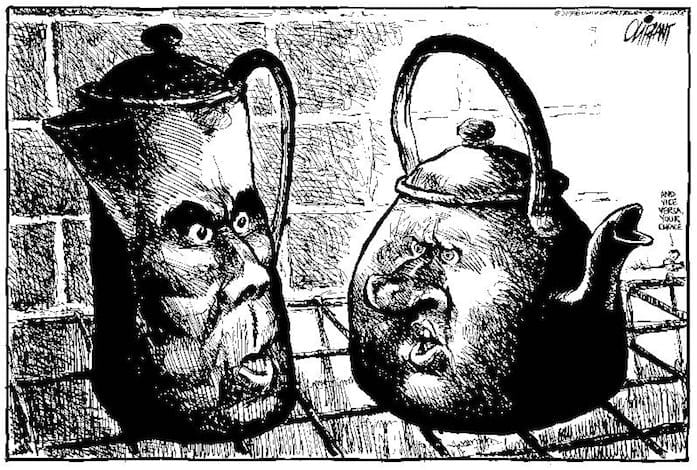They were both questions,
Sorry, those were statements made in the form of a question. I would be surprised that any reader would have taken these be legitimate straightforward questions.
In addition, it's a rather well accepted premise that someone who makes a claim should
support their own claim. So at best, it would be a
red herring to use the phrase "your homework" (to mean
me) when I had merely requested you back up your own statement - to wit:
there (are) enough references to be able to equate this with Satan as well
But maybe you were having a bad day, and just hadn't followed the flow of the conversation. So I'll ask again, what references might there be to equate Satan as "the god of this world"
after Jesus said Mat. 28:18?
And Jesus came and spake unto them, saying, All power/authority is given unto me in heaven and in earth.
(Matthew 28:18 KJV)
... because a god has power and authority over an actual domain.
Satan? The devil?
Ye are of your father the devil, and the lusts of your father ye will do. He was a murderer from the beginning, and abode not in the truth, because there is no truth in him. When he speaketh a lie, he speaketh of his own: for he is a liar, and the father of it.
(John 8:44 KJV)
And one of his greatest lies is perpetrated by the Church - that he is the "god of this world."
We had been speaking of context in another thread, and this passage shows the importance of such context. To the reader of Paul, who would have been "the god of this world"? Perhaps my mistake was to omit the sources for my claim that every reader would have known this to be a cunningly veiled reference to the Roman Emperor. So... I'll spend the time necessary to support
my claim.
"Ultimately the Romans did advance one cult, which took on some of the characteristics of a universal religion and became a political tool in the interest of stability - a symbol of loyally to the state and its rulers. This was, of course, the imperial cult, the worship of the emperor-as-god.
Augustus was officially deified at his death; this became the standard practice; there were only occasional exceptions, as when Caligula and Domitian in the first century, and Commodus in the second demanded recognition as deity in their lifetimes. The provincial councils made up of upper-class men, gave much attention to the imperial cult; as also did the Augustales, priestly college of freedmen; other priestly colleges included rites to the emperors in their regular observances; and the army made much of it, as in oaths and obervance of birth dates. The imperial cult thus touched the lives of many persons in all the social strata. As in the case of other state cults, the proper observance of its ceremonies became a symbol patriotism, as well as piety."
- (pgs. 270,271)
Ideal for a one-semester course in Roman civilization o…

www.goodreads.com
Indeed, the god of this world (the Roman Emperor) hath blinded the minds of them which believe not, and the cult of emperor-as-god was ubiquitous in the Roman world by the time of Paul. Augustus reigned as the first Roman emperor from
27 BC until his death in AD 14. The reign of Augustus initiated an imperial cult (
Wiki-LINK). Caligula, was Roman emperor from AD 37 until his assassination in AD 41. Domitian was Roman emperor from 81 to 96. The Apostle Paul having a ministry from circa 31–36 AD until his death somewhere between 64 & 68 AD.
Anyway, with your reply above, you just confirmed that my 2nd question would have been as valid to use as the 1st one was.
"You want me to tell you so you can tear them apart?"
No.
I wanted you to actually provide support for your claim. (That's how discussions work.)
Rhema
